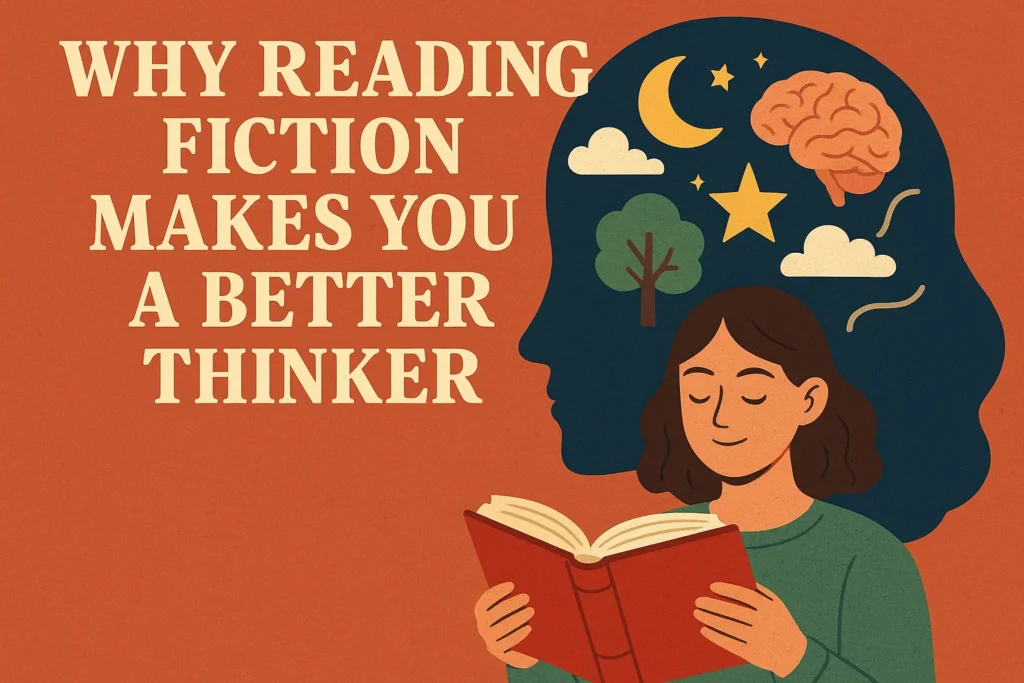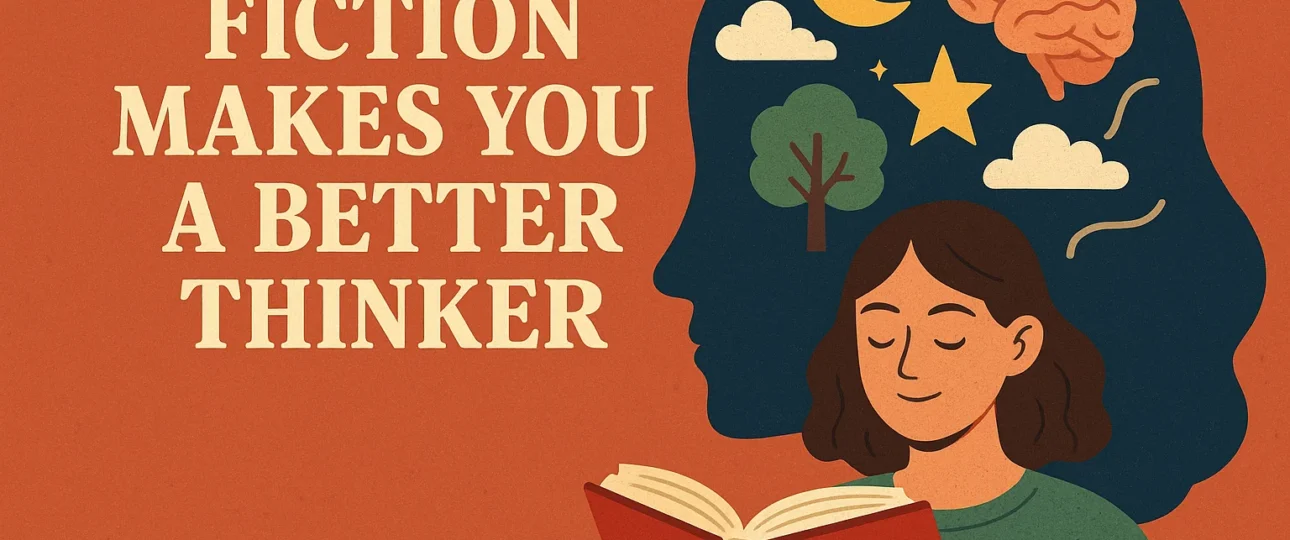In a world that often values productivity, logic, and data-driven decisions, fiction might seem like a luxury or an escape from reality. However, research and expert opinions increasingly show that reading fiction is not just about entertainment—it plays a vital role in shaping our cognitive abilities. In this article, we’ll explore why reading fiction makes you a better thinker and how diving into imaginative worlds can sharpen real-world intelligence.
The Cognitive Power of Fiction
Fiction engages the brain differently than non-fiction. When you read a novel, especially one rich in characters and complex narratives, your mind doesn’t just process words—it simulates real-life experiences. You step into someone else’s shoes, perceive their emotions, predict consequences, and navigate moral dilemmas. This mental exercise significantly enhances your cognitive flexibility and emotional intelligence.

Enhances Empathy and Theory of Mind
One of the most significant reasons why reading fiction makes you a better thinker is its impact on empathy. Fictional stories immerse readers in the inner lives of characters. Whether it’s a young orphan battling societal injustice or a time traveler confronting moral paradoxes, readers are compelled to understand different perspectives.
This mental habit nurtures what’s called the “theory of mind”—our ability to attribute mental states to others. Studies have shown that regular fiction readers score higher on empathy tests and are better at interpreting social cues. Empathy is not just emotional; it’s a cognitive skill that enhances decision-making, leadership, and communication.
Encourages Critical and Reflective Thinking
Fiction invites readers to interpret, infer, and analyze. Unlike non-fiction that often presents facts and conclusions, fiction requires readers to fill in gaps, question motives, and interpret symbolic meanings.
For instance, a story may subtly criticize social norms or explore philosophical questions through metaphor and allegory. Readers must think beyond the literal to understand deeper meanings. This habit strengthens abstract thinking, pattern recognition, and reflective judgment—key qualities of a sharp thinker.
Improves Focus and Concentration
In an age of constant digital distraction, maintaining focus has become a rare skill. Reading fiction demands sustained attention, especially when plots are intricate and character-driven. You can’t multitask when you’re immersed in a gripping story—you have to follow the narrative thread, remember details, and stay mentally present.
This mental discipline improves overall concentration, patience, and attention span—traits that enhance productivity and deeper thinking in other areas of life.
Fiction as Mental Simulation
Another reason why reading fiction makes you a better thinker is its function as a simulator for real life. Just like pilots use flight simulators to practice handling complex scenarios, readers use fiction to mentally explore situations they may never face directly. Through characters, plots, and conflicts, we “rehearse” how to deal with moral choices, uncertainty, fear, joy, and loss.
This form of safe exploration builds mental resilience and adaptive thinking. It prepares readers to handle ambiguity and complexity in real life with greater confidence and nuance.
Expands Imagination and Creativity
Imagination is not just for artists—it’s the foundation of innovation, problem-solving, and vision. Fiction, particularly genres like science fiction or fantasy, pushes the boundaries of the imaginable. It invites readers to think about “what if” scenarios, futuristic technologies, or alternate social systems.
This imaginative stretch exercises the brain’s creative muscle, making readers more inventive and open-minded. When you imagine fantastical worlds, you become more capable of envisioning new solutions in real life—whether it’s designing a product, managing a team, or navigating personal challenges.
Strengthens Language and Communication Skills
Reading fiction exposes you to a wide range of vocabulary, expressions, and communication styles. Well-written fiction teaches nuance in language—how tone, body language, and dialogue can convey complex emotions or subtext.
These linguistic skills are critical in personal and professional life. Whether you’re writing a report, negotiating with a client, or comforting a friend, the communication patterns you absorb from fiction can help you express yourself more clearly and persuasively.
Fiction Builds Mental Flexibility
Mental flexibility is the ability to shift thinking strategies when situations change. It’s a key aspect of intelligence, especially in today’s rapidly evolving world. Fiction enhances this by exposing readers to diverse viewpoints, unconventional ideas, and varied life experiences.
A novel might present a culture you’re unfamiliar with or challenge your moral assumptions. This gentle confrontation with “the other” makes readers more intellectually humble and adaptable. They learn that truth is multifaceted and that complexity often defies easy answers—hallmarks of a mature, thoughtful mind.
Psychological and Scientific Support
Numerous studies support the cognitive benefits of reading fiction:
- A 2013 study published in Science found that reading literary fiction improves the ability to understand others’ mental states—a crucial element of social intelligence.
- Neuroscientists have found that reading fiction activates multiple areas of the brain, including those responsible for language, sensory processing, and emotional engagement.
- Long-term studies show that frequent readers are not only more empathetic but also better at solving social and ethical problems.
These findings reinforce the idea that reading fiction makes you a better thinker is not just philosophically—it’s backed by science.
Fiction vs. Non-Fiction: Not a Competition
It’s important to note that this isn’t an argument against non-fiction. Biographies, histories, and how-to books provide knowledge and context that are immensely valuable. However, fiction offers something different: it trains the how of thinking—how we empathize, reflect, and imagine.
Where non-fiction often informs, fiction transforms. It doesn’t just add information; it changes the way we think and see the world.
Practical Tips to Reap the Benefits
If you’re convinced of why reading fiction makes you a better thinker, here are a few tips to get started or deepen your practice:
- Read Across Genres: Explore literary fiction, science fiction, fantasy, historical novels, and mystery. Each genre offers different cognitive and emotional experiences.
- Choose Quality over Quantity: It’s better to read one well-written, thought-provoking novel slowly than to skim through several forgettable ones.
- Reflect and Discuss: Join a book club or write brief reflections after reading. This helps deepen your understanding and practice your thinking skills.
- Make it a Habit: Dedicate a specific time each day to reading fiction, even if it’s just 15–20 minutes.
Final Thoughts
In a culture obsessed with productivity hacks and self-improvement strategies, fiction might seem like an indulgence. But the truth is, fiction is a powerful tool for mental growth. It builds empathy, sharpens focus, improves communication, and enhances creativity. More importantly, it trains your brain to think more deeply, flexibly, and compassionately.
So the next time someone asks you why you’re reading a novel instead of a business book, smile and tell them exactly why reading fiction makes you a better thinker. Because in the pages of those imaginary worlds, you’re training to be a wiser, more thoughtful, and more imaginative human being.
Read More 7 Ways to Make Time for Literature Every Day
See More Believe and Achieve


1 Comment
[…] Read More Why Reading Fiction Makes You a Better Thinker […]